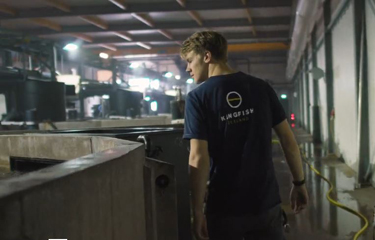The Kingfish Company announced it has received a U.S. Army Corps of Engineers permit for its planned recirculating aquaculture system (RAS) facility in Jonesport, Maine, U.S.A.
The company first unveiled its plans for its RAS project in November 2019, and since then has been working to receive the permitting required for the build the farm. The company filed its first permit application in 2020, and since then has received permits from the Maine Department of Environmental Protection and approval of its Submerged Land Lease Application. The latest permit required to begin construction is the main federal permit required for the facility, the company said.
“This news follows the approval of key permits from the State of Maine Department of Environmental Protection (MDEP) and critical water-side permits in 2021,” the company said. “Kingfish Maine is in the last phases of design, and contractor bidding selection is underway.”
The company said it plans to deploy the same technology in Maine as it has in The Netherlands, where the company produced 1,154 metric tons (MT) of yellowtail kingfish in 2021.
“Upon completion, the facility in Jonesport, Maine, will serve as Kingfish’s first production facility in the U.S. as the company looks to replicate its successful operation in Europe and establish significant local sustainable seafood production for U.S. retailers and food service,” the company said. “[In May], 2,000 fingerlings were transported from The Netherlands to our new hatchery facility site in Franklin, Maine, U.S.”
The progress on permitting comes as some residents in Jonesport are pushing for a moratorium on industrial aquaculture. The Bangor Daily News reported that residents in the town have circulated a petition to enact a moratorium prohibiting commercial aquaculture development in the town – either on the land or in the water.
In an interview at the 2022 Seafood Expo North America in March, Kingfish Company CEO Ohad Maiman told SeafoodSource his company is still seeking additional funding for the project.
“I would say funding for growth right now is not optimal,” he said. “We are working still with several banks and continue to have investor relations and incoming approaches, but we need to find efficient funding and the right moment in time to move it forward. And then we will be better ready to execute efficiently. So we have patience but we’re working hard to expedite where possible.”
The long-term outlook for the project’s success is still positive, Maiman said. With the COVID-19 pandemic pushing Americans to try new types of seafood and eat more fish overall, the business proposition for the farm is strong, he said.
Photo courtesy of The Kingfish Company







